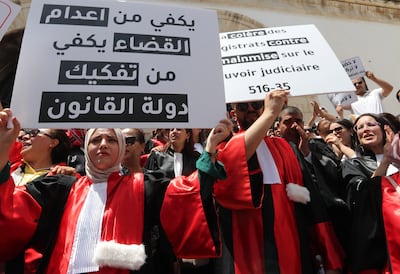More than 30 Tunisian MPs proposed an urgent bill on Friday to amend the country's electoral law, in an attempt to strip the Administrative Court of its role as an adjudicator in election-related disputes before the October 6 presidential vote.
The bill, which was published on the Tunisian Parliament’s website, suggests the revision of six articles of the electoral law, and the entire substitution of 15 more.
The changes proposed by the 34 legislators include the removal of the Administrative Court, the judiciary body considered the primary referee in all phases of the electoral process – including appeals against the electoral authority’s decisions, the supervision of campaign funding and the challenging of election results.
The Administrative Court is seen as one of the last remaining independent judicial bodies in Tunisia after President Kais Saied consolidated all branches of power and dissolved the High Judicial Council in July 2021.
The Court of Appeal – and in case of a second phase of adjudication – the Court of Cassation, would be put forward as a replacement, the bill says.
“The provisions of this law apply to disputes that are continuing as of the date of its issuance and relating to the 2024 presidential elections, regardless of the judicial authority in charge and at any stage of litigation,” the text reads, suggesting that if it is passed within the remaining 14 days before the October 6 vote, its stipulations would be legally binding.

Tunisia’s Administrative Court has been at the centre of a legal struggle with the Independent High Authority for Elections (ISIE) over its decision to accept appeals by three other presidential hopefuls and allow their return to the race.
The decision, which the court said is binding and should be implemented immediately, was rejected by ISIE as it went forward with announcing a final list of three candidates instead of six and challenged its legal authority.
The MPs who are suggesting the electoral law amendment said in the text that their “legislative initiative is inevitable” amid the continuing conflict between the Administrative Court and ISIE.
“[The situation] alerts us to the beginning of potential crises and an imminent danger that threatens the electoral process and could plunge the country into a maze that would distance us from the concerns of the general public,” the text read.
The legislators also accused the court’s judges of not complying with the principles of neutrality and non-disclosure, describing some of their public statements as “dangerous”.
However, some MPs have voiced opposition to the electoral law amendments.
“We are surprised that such an initiative is being presented in parliament when we are already in the presidential race. Courts' jurisdictions are always determined before that,” Mohamed Ali, a member of the National Sovereign bloc, told The National.
“This can only be understood that, as the electoral process has not been going in a way that satisfies a certain party, something needs to be done,” he added.
Mr Ali criticised the electoral authority's rejection of the Administrative Court’s rulings, describing it as “intentional exclusion” that he believes could create valid concerns over the legitimacy of the presidential election.
“This is a direct punishment of the Administrative Court for its stance, and is a pre-emptive attempt to prevent any potential questioning of the election's legitimacy, which have already started,” he said.
“We cannot use the parliament as a pathway to strike the legitimacy of the Administrative Court, and we will work to ensure that it will not be shoved into this power struggle or these attempts to whitewash the elections.”
Following the 2022 constitutional referendum, the judiciary has been downgraded from a separate branch of government to function in a much weaker role. The moves have been criticised as part of attempts by Mr Saied’s government to undermine courts’ independence.

